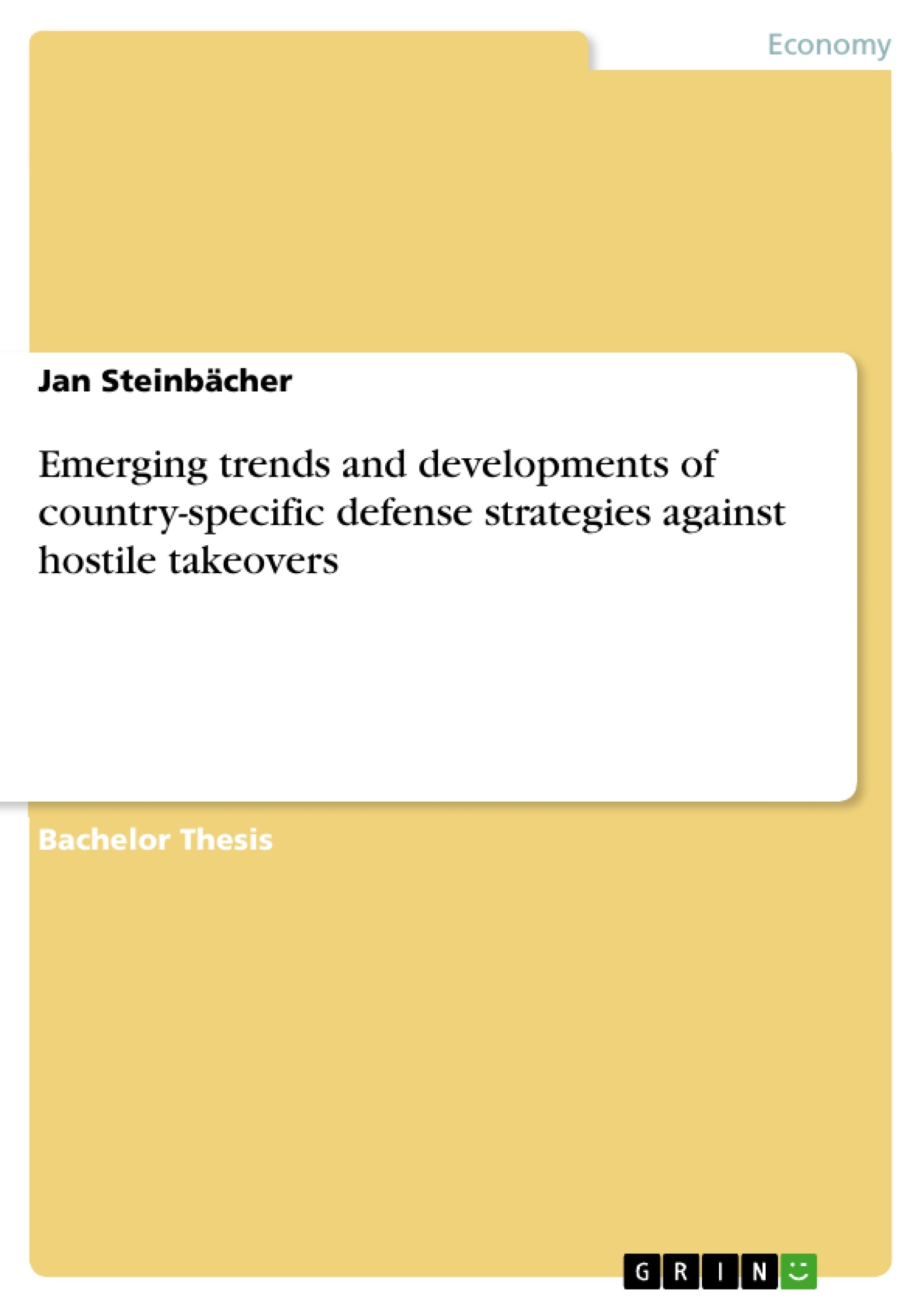Objective of this thesis was to identify the trends and developments of country-specific defense strategies against hostile takeovers and their determinants. Thus, it was necessary to analyze which possibilities of corporate defense would actually be feasible in certain countries.
Defense strategies were subdivided into preventive and ad-hoc strategies. National characteristics and differentiators were shown and analyzed regarding their suitability as a defense measure.
Especially in France and Germany the big influential players have been in a process of change: banks and governments are pursuing different investment strategies and companies loose their “systematic protection”. The example of Germany illustrates that companies are looking for protective alternatives as old structures like the Rhenish capitalism are breaking up.
The growth of M&A activities, especially of hostile takeovers, has affected national legislation to tighten their regulations; France has lifted barriers regarding takeovers (both friendly and hostile) regarding 11 specific industries at the time being. This example illustrates the increasingly protectionist behavior in Europe on a governmental level.
Corporate Governance generally takes shareholders more and more into consideration regarding the vote on the adoption of defense measures and golden parachutes. In the US, companies started to diminish golden parachutes as a result of the proposal of activist shareholders. In many European countries, however, there are still enough loopholes to avoid foregone shareholder voting.
A contrary trend is to be seen in the US, where poison pills are diminished on a fast pace. In addition, shareholders vote increasingly in favor of declassified boards.
Golden parachutes are still prevalent, but not for defense reasons. It was found that their effect is hardly predictable. Shareholders sharply criticize their adoption and increasingly vote against them.
A change in Japan’s legislation allows hostile takeovers since May 2007. Consequently, Japanese companies are about to set up poison pills to protect themselves.
Inhaltsverzeichnis (Table of Contents)
- 1 Introduction
- 2 The historical development of M&A
- 2.1 Current situation
- 2.2 Reasons for Mergers & Acquisitions
- 2.2.1 Hostile takeovers A definition....
- 2.3 Arguments for and against hostile takeovers
- 2.4 Defense options of hostile takeovers
- 2.4.1 The legitimacy of defense strategies / legal basis
- 2.4.2 Preventive defense measures
- 2.4.3 Effective defense measures of the management
- 2.4.4 Obligation to neutrality of the management board
- 2.5 Takeover laws in France
- 3 Corporate Governance as determinant
- 3.1 Definition of Corporate Governance
- 3.2 Corporate Governance in Germany
- 3.3 Corporate Governance in France
- 3.4 Corporate Governance in Great Britain and Canada
- 4 Regulatory environment & decision-criteria
- 4.1 Success factors of acquisitions
- 4.1.2 International experience
- 4.1.3 Industry
- 4.1.4 Enterprise size
- 4.1.5 Degree of relationship/target country
- 5 Hostile takeovers in the 21st century
Zielsetzung und Themenschwerpunkte (Objectives and Key Themes)
This thesis aims to explore the evolving trends and developments of country-specific defense strategies against hostile takeovers, analyzing the factors that influence their feasibility. The research draws primarily from international literature and publications, with additional insights gained from interviews with investment professionals.
- Comparative Analysis of Defense Strategies Across Countries
- Influence of National Legislation and Regulatory Environment on Defense Strategies
- Role of Corporate Governance in M&A Defense
- Evolution of Hostile Takeover Tactics in the 21st Century
- Factors Affecting the Success of Acquisitions
Zusammenfassung der Kapitel (Chapter Summaries)
The thesis begins with an introduction and then delves into the historical development of mergers and acquisitions (M&A), outlining the current situation and providing definitions and arguments for and against hostile takeovers. It explores various defense options, including their legal basis, preventive measures, and effective management strategies. The work also examines the role of corporate governance in different countries, including Germany, France, Great Britain, and Canada. Chapter 4 focuses on the regulatory environment and decision-criteria affecting acquisitions, highlighting success factors and international experiences. Finally, the thesis explores the implications of hostile takeovers in the 21st century.
Schlüsselwörter (Keywords)
Hostile takeovers, mergers and acquisitions (M&A), defense strategies, corporate governance, country-specific regulations, preventive measures, regulatory environment, success factors, international experience, 21st century trends.
Frequently Asked Questions
What is the difference between preventive and ad-hoc defense strategies?
Preventive strategies are implemented before a takeover bid occurs to discourage hostile suitors, while ad-hoc strategies are reactive measures taken once an actual bid has been made.
How has the role of banks changed in Germany and France regarding corporate defense?
Traditional structures like "Rhenish capitalism" are breaking up, meaning banks and governments are changing investment strategies, leading to a loss of "systematic protection" for companies.
What is the trend regarding "poison pills" in the United States?
Contrary to some other regions, the use of poison pills in the US is diminishing at a fast pace as shareholders advocate for more open corporate governance.
How does corporate governance affect defense measures?
There is an increasing global trend to give shareholders more power to vote on the adoption of defense measures and executive "golden parachutes."
What significant change occurred in Japan's takeover legislation in 2007?
Legislation changed in May 2007 to allow hostile takeovers, prompting Japanese companies to start implementing defense mechanisms like poison pills for the first time.
Are golden parachutes an effective defense strategy?
The thesis found that their effect is hardly predictable and they are increasingly criticized and voted against by shareholders, often no longer serving as a primary defense tool.
- Quote paper
- Jan Steinbächer (Author), 2007, Emerging trends and developments of country-specific defense strategies against hostile takeovers, Munich, GRIN Verlag, https://www.grin.com/document/79369



